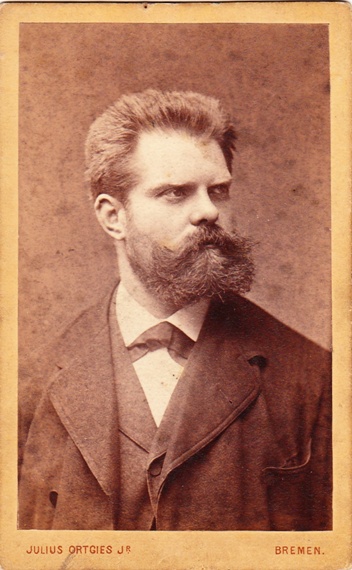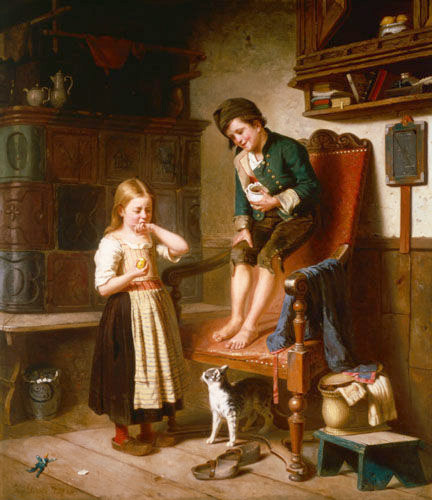|
Julius Geertz
Julius Geertz (21 April 1837–21 October 1902) was a German artist of the Düsseldorf school of painting. Biography Geertz was born in Hamburg where he began his artistic studies under the brothers Günther Gensler and , then worked for some time as a private student of the former, after which he became a pupil of Adolf des Coudres in Karlsruhe. He moved to Düsseldorf in 1860 and entered the studio of Rudolf Jordan. In 1864 he travelled to Paris, where he studied the work of the old masters, and afterwards to Brittany and the Netherlands. He then settled in Düsseldorf, where he painted genre scenes, partly serious, partly humorous, taken from ordinary life and the doings of young people; among these ''Der Verbrecher nach der Verurteilung'' ("The Criminal after the Judgement") established his reputation. He is counted as one of the so-called Düsseldorf School. His works are distinguished by serious effort to capture the truth to life of individual character, excell ... [...More Info...] [...Related Items...] OR: [Wikipedia] [Google] [Baidu] |
Julius Geertz
Julius Geertz (21 April 1837–21 October 1902) was a German artist of the Düsseldorf school of painting. Biography Geertz was born in Hamburg where he began his artistic studies under the brothers Günther Gensler and , then worked for some time as a private student of the former, after which he became a pupil of Adolf des Coudres in Karlsruhe. He moved to Düsseldorf in 1860 and entered the studio of Rudolf Jordan. In 1864 he travelled to Paris, where he studied the work of the old masters, and afterwards to Brittany and the Netherlands. He then settled in Düsseldorf, where he painted genre scenes, partly serious, partly humorous, taken from ordinary life and the doings of young people; among these ''Der Verbrecher nach der Verurteilung'' ("The Criminal after the Judgement") established his reputation. He is counted as one of the so-called Düsseldorf School. His works are distinguished by serious effort to capture the truth to life of individual character, excell ... [...More Info...] [...Related Items...] OR: [Wikipedia] [Google] [Baidu] |
Johann Peter Theodor Janssen
Johann Peter Theodor Janssen (12 December 1844, Düsseldorf – 19 February 1908, Düsseldorf) was a German historical painter. Biography Janssen was born in Düsseldorf, son of the engraver (1817–1894), by whom he was first instructed before studying at the Academy under Karl Sohn and Bendemann. He is principally known through a series of decorative works whose monumental style and sound naturalism won him a reputation as one of the foremost historical painters of his time. He became professor at the Düsseldorf Academy in 1877 and its director in 1895, and was elected a member of the Prussian Academy of Arts in 1885. In Berlin, he worked also for Emil Hünten. His more important mural paintings include: * "The Colonization of the Baltic Coast" (1872), in the exchange at Bremen * "The Myth of Promethus," in 12 compositions, in the second Cornelius Room of the National Gallery in Berlin * "Seven Momentous Episodes in the History of Erfurt" (1882), Town Hall, Erfurt * "Human ... [...More Info...] [...Related Items...] OR: [Wikipedia] [Google] [Baidu] |
19th-century German Male Artists
The 19th (nineteenth) century began on 1 January 1801 ( MDCCCI), and ended on 31 December 1900 ( MCM). The 19th century was the ninth century of the 2nd millennium. The 19th century was characterized by vast social upheaval. Slavery was abolished in much of Europe and the Americas. The First Industrial Revolution, though it began in the late 18th century, expanding beyond its British homeland for the first time during this century, particularly remaking the economies and societies of the Low Countries, the Rhineland, Northern Italy, and the Northeastern United States. A few decades later, the Second Industrial Revolution led to ever more massive urbanization and much higher levels of productivity, profit, and prosperity, a pattern that continued into the 20th century. The Islamic gunpowder empires fell into decline and European imperialism brought much of South Asia, Southeast Asia, and almost all of Africa under colonial rule. It was also marked by the collapse of the large S ... [...More Info...] [...Related Items...] OR: [Wikipedia] [Google] [Baidu] |
19th-century German Painters
The 19th (nineteenth) century began on 1 January 1801 ( MDCCCI), and ended on 31 December 1900 ( MCM). The 19th century was the ninth century of the 2nd millennium. The 19th century was characterized by vast social upheaval. Slavery was abolished in much of Europe and the Americas. The First Industrial Revolution, though it began in the late 18th century, expanding beyond its British homeland for the first time during this century, particularly remaking the economies and societies of the Low Countries, the Rhineland, Northern Italy, and the Northeastern United States. A few decades later, the Second Industrial Revolution led to ever more massive urbanization and much higher levels of productivity, profit, and prosperity, a pattern that continued into the 20th century. The Islamic gunpowder empires fell into decline and European imperialism brought much of South Asia, Southeast Asia, and almost all of Africa under colonial rule. It was also marked by the collapse of the large S ... [...More Info...] [...Related Items...] OR: [Wikipedia] [Google] [Baidu] |
German Genre Painters
German(s) may refer to: * Germany (of or related to) ** Germania (historical use) * Germans, citizens of Germany, people of German ancestry, or native speakers of the German language ** For citizens of Germany, see also German nationality law **Germanic peoples (Roman times) * German language **any of the Germanic languages * German cuisine, traditional foods of Germany People * German (given name) * German (surname) * Germán, a Spanish name Places * German (parish), Isle of Man * German, Albania, or Gërmej * German, Bulgaria * German, Iran * German, North Macedonia * German, New York, U.S. * Agios Germanos, Greece Other uses * German (mythology), a South Slavic mythological being * Germans (band), a Canadian rock band * "German" (song), a 2019 song by No Money Enterprise * ''The German'', a 2008 short film * "The Germans", an episode of ''Fawlty Towers'' * ''The German'', a nickname for Congolese rebel André Kisase Ngandu See also * Germanic (other) * ... [...More Info...] [...Related Items...] OR: [Wikipedia] [Google] [Baidu] |
Artists From Düsseldorf
An artist is a person engaged in an activity related to creating art, practicing the arts, or demonstrating an art. The common usage in both everyday speech and academic discourse refers to a practitioner in the visual arts only. However, the term is also often used in the entertainment business, especially in a business context, for musicians and other performers (although less often for actors). "Artiste" (French for artist) is a variant used in English in this context, but this use has become rare. Use of the term "artist" to describe writers is valid, but less common, and mostly restricted to contexts like used in criticism. Dictionary definitions The ''Oxford English Dictionary'' defines the older broad meanings of the term "artist": * A learned person or Master of Arts. * One who pursues a practical science, traditionally medicine, astrology, alchemy, chemistry. * A follower of a pursuit in which skill comes by study or practice. * A follower of a manual art, such as a m ... [...More Info...] [...Related Items...] OR: [Wikipedia] [Google] [Baidu] |




